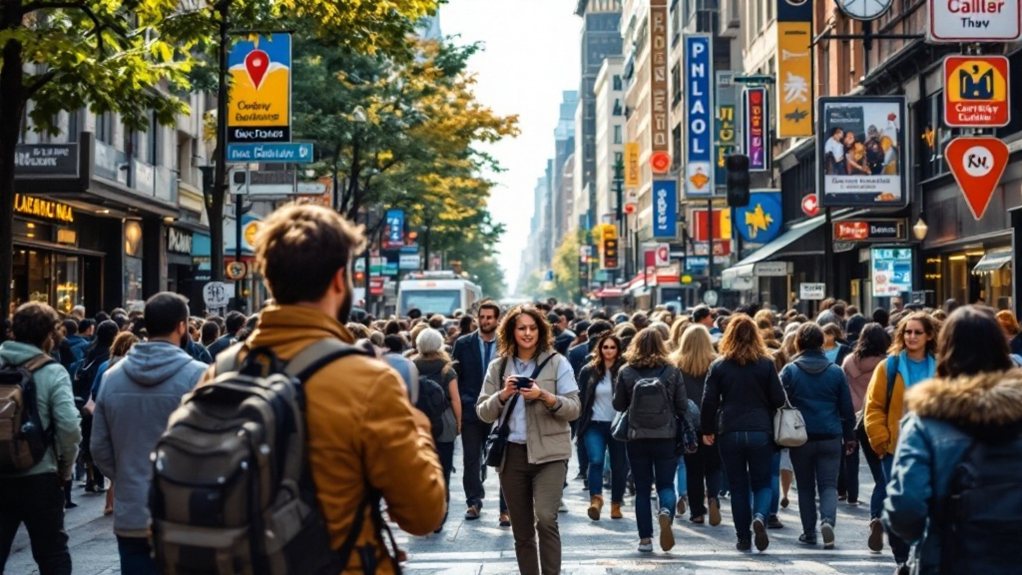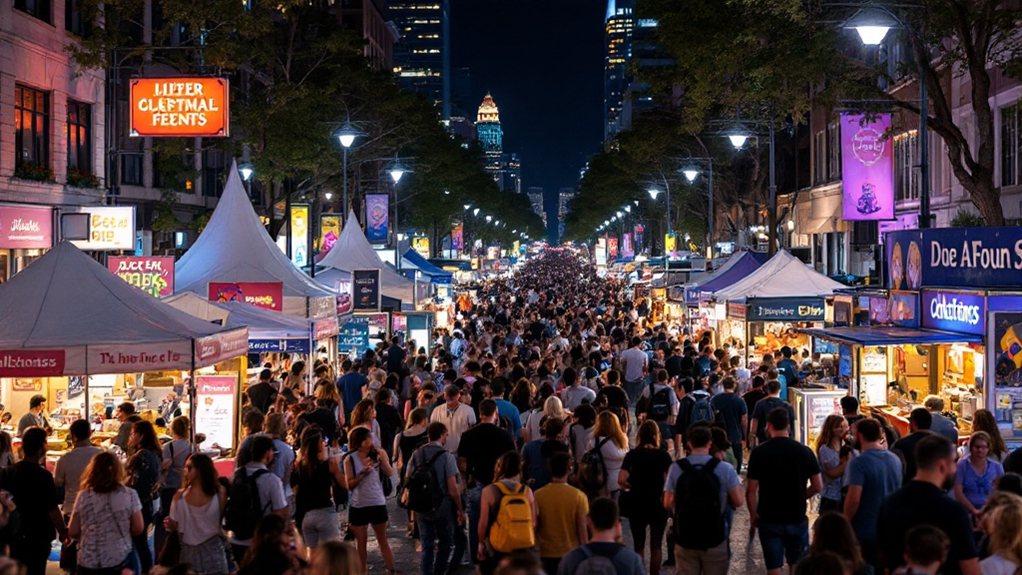To write effective city event coverage for local SEO, you'll want to leverage geo-targeted keyword research, optimize location-specific content, and diversify your approach. Craft unique, community-driven pages that resonate with your target audience using local keywords. Analyze competitors' strategies and incorporate hyperlocal elements to establish a strong connection within the community. By strategically leveraging these techniques, you can maximize the visibility and impact of your city event coverage – and there's more to explore.
Geo-Targeted Keyword Research for City Events

When conducting geo-targeted keyword research for city events, you'll want to leverage location-based keyword tools like Google Keyword Planner, Ahrefs, and SEMrush. Examine your competitors' content to identify location-specific keywords they use. Engage with local online forums to understand common location-specific terms. Research keywords related to local events, such as festivals or concerts. Incorporate terms like city names, neighborhood names, or regional nicknames into your keywords. Geo-targeted content is essential for SMBs relying on walk-ins, service calls, or location-centric leads. This will help you align your content with the specific geographic context of your target audience's searches.
Optimizing Location-Specific Content for Local Search

Optimizing location-specific content is crucial for boosting your local search visibility. Focus on crafting unique, community-driven content that resonates with your target audience in each city. Leverage local keywords to create an engaging user experience and strengthen your brand's local presence. Incorporate customer testimonials and visuals to build trust and credibility within the local community.
Geo-Targeted Keyword Research
Effective geo-targeted keyword research is the cornerstone of optimizing location-specific content for local search success. Start by brainstorming seed keywords related to your business services, then pair them with geographic modifiers to create targeted terms. Utilize keyword generation tools to efficiently produce location-specific keywords, and prioritize based on search volume and competition levels. Analyze local search trends using Google Trends to identify popular keywords in your area. Engaging with regional communities and analyzing customer feedback can reveal valuable location-specific language to incorporate. Remember to balance geo-targeted keywords with readability to avoid SEO penalties. Effective geo-targeting is key to boosting your local online visibility.
Location-Specific Content Optimization
Creating location-specific content is essential for boosting your local search engine visibility. Optimize each page with city-specific metadata and title tags to improve geographic relevance. Embed Google Maps to help users find your location and verify your business presence. Ensure consistent NAP details across platforms. Craft unique content for each location, avoiding duplication. Highlight local landmarks, events, and community involvement to establish a connection with your target audience. Responsive design ensures a seamless mobile experience. By aligning your content with local user intent, you'll attract targeted traffic, enhance user experience, and gain a competitive edge in your market. [Local search intent signals buying intent, often immediate, unlike general searches.
Keyword Localization Strategies
Keyword localization is key to boosting your local search visibility. Conduct thorough research using tools like Google Keyword Planner and Semrush to uncover the most relevant local keywords. Local keywords are a fundamental element of search engine optimization (SEO). Combine your core services or products with specific cities, neighborhoods, or landmarks to create targeted phrases. Incorporate long-tail keywords and question-based queries to capture various search intents. Optimize your location pages with consistent NAP, local images, and content that answers common questions. Maintain separate keyword strategies for each of your business locations to address distinct search behaviors in each area.
| Keyword Research | Keyword Structuring | Local Optimization |
|---|---|---|
| Identify location-specific terms | Combine services/products with locations | Create location-specific content |
| Evaluate search volume and competition | Use long-tail and question-based keywords | Enhance pages with local elements |
| Prioritize high-value local keywords | Incorporate local landmarks and ZIP codes | Maintain consistent NAP across platforms |
Diversifying Keywords for City Event Coverage

To effectively cover a city event for local SEO, you'll want to blend geographic keywords and leverage more localized long-tail terms. This helps you target a specific audience and rank for relevant searches. Experiment with a mix of location-based phrases and event-related keywords to capture the attention of your local readers.
Geographic Keyword Blends
One of the keys to crafting effective city event coverage for local SEO is leveraging geographic keyword blends. Incorporate specific city names for targeted local SEO, like "Events in New York City". Broaden reach with state-based keywords, such as "California festival schedules". Target hyperlocal neighborhoods with "Events in Brooklyn". Blend event names with city names for precise coverage, as in "New York City Marathon". Use general location keywords like "Events near me" to attract spontaneous local visitors. Utilizing keyword research tools can help identify the most relevant geographic keyword blends. Analyze competitors, focus on local intent searches, and create location-specific content to optimize your geographic keyword blends.
Localized Long-Tail Terms
While keyword research is crucial for city event coverage, leveraging localized long-tail terms can significantly amplify your local SEO strategy. These hyper-targeted keywords attract highly engaged traffic, often face lower competition, and lead to higher conversion rates. Incorporate event-specific, community-involved, and location-centric terms to ensure your content is relevant to local searches. Local keywords include geographic modifiers like city names or regions. Diversifying your keyword approach increases visibility, reaches a broader audience, and enhances the overall user experience. Complement your localized long-tail terms with a content strategy that resonates with your local tech community, leveraging interviews, cultural integration, and engaging storytelling. This strategic approach will elevate your city event coverage and deliver impactful local SEO results.
Competitor Analysis for Event Keyword Strategies
Conducting a thorough competitor analysis is pivotal when crafting your event keyword strategies. By dissecting your competitors' keyword utilization, you can uncover their strengths and weaknesses, revealing opportunities to outrank them. Examine their content strategy, SEO performance, and backlink profiles to identify areas you can improve upon. Leveraging competitor keyword data can inform your content creation, on-page optimization, and link building efforts, enhancing your local SEO for event coverage. Leverage tools like SE Ranking, Ubersuggest, and SEM Rush to gain insights into their keyword approaches. Focus on intent-driven, high-volume keywords that align with your business goals. Prioritize topics based on audience interest and search volume analysis, setting benchmarks against competitors.
Localizing Keywords to Target the Right Audience
Effective local SEO for events starts with honing in on geo-specific keywords. You'll want to tailor your content to the specific location, incorporating keywords that match the local intent of your target audience. Optimizing the event listing can help ensure your event is discoverable by the right people. By identifying the right local keywords, you can reach the people most likely to attend your event.
Geo-Specific Keyword Research
Why is geo-specific keyword research crucial for local SEO success? It helps you identify the most relevant terms that your target audience is searching for in your local market. Start by listing relevant business terms and location modifiers like city or neighborhood names. Use tools to analyze local keywords, and study your competitors' strategies to find less competitive options. Prioritize keywords based on relevance, search volume, and competition, then continuously refine your list as you monitor performance data. Incorporate these geo-specific keywords naturally throughout your content, from title tags to headers, to improve visibility in local search results. Regularly track your progress using analytics and customer feedback to optimize your approach.
Tailoring Content to Location
As you aim to cover local events for maximum impact, it's crucial to tailor your content to the specific location. Leverage customized landing pages that highlight the unique aspects of events in each city. Incorporate local keywords into your blog posts, ensuring they reflect the geographical area and the event's industry. Share success stories about local events to build trust with your audience, and include hyperlocal elements like references to landmarks or cultural influences. Engage with the community by highlighting your involvement in local initiatives or sponsorships. By tailoring your content to the location, you'll foster a stronger connection with your target audience and enhance your local SEO visibility.
Identifying Local Intent
To effectively reach your local audience, you'll need to identify their search intent and tailor your keywords accordingly. Focus on location-specific keywords, proximity indicators, and high-intent phrases to capture immediate purchase needs. Analyze community research, leverage keyword tools, and study competitor strategies to uncover the right local keywords. Integrate this intent into your meta tags, content, and business listings for enhanced visibility. Pay attention to device, time, and proximity signals that shape local search results. By prioritizing relevant, competitive, and location-specific high-intent keywords, you can optimize your content to attract ready-to-convert customers in your area.
Crafting Engaging Titles and Meta Tags for Events
Crafting engaging titles and meta tags for events is crucial for attracting potential attendees and improving your local SEO performance. Conduct thorough keyword research to identify relevant terms for your event title. Ensure your title tag includes primary keywords and the event location to enhance local SEO. Add a unique and catchy phrase to differentiate your title. When crafting meta descriptions, focus on enticing users to click through by highlighting event benefits and using a call to action. Optimize your event schema to provide search engines with key details and improve rich snippet visibility. Leverage diverse content types and internal linking to further boost your event's SEO.
Incorporating Local References in Event Content
Incorporating local references into your event content is a powerful way to connect with your target audience and boost your local SEO efforts.
Leverage geo-specific details by mentioning nearby landmarks or neighborhoods. Utilize local dialect and colloquialisms to make your content more relatable. Highlight collaborations with influential local businesses or personalities to enhance community engagement.
Optimizing Images for City Event SEO
Optimizing the images used in your city event coverage is a crucial aspect of local SEO. By implementing image SEO techniques, you can enhance the visibility of your event in search results and attract more attendees. Ensure your images have descriptive file names, compelling alt text, and are properly compressed for faster load times. This not only improves user experience but also positively impacts your Core Web Vitals, which are crucial for Google rankings. Additionally, create unique, visually appealing images that support your event's narrative. Monitoring your image SEO performance and adjusting your strategies accordingly will help you stay ahead of the competition and maximize the impact of your city event coverage.
Building Local Citations and Listings for Event Visibility
Building a strong network of local citations is crucial for enhancing the visibility of your city events in search results. Cultivate both structured citations on directories like Yelp and unstructured mentions across blogs and social media. Consistent NAP (name, address, phone) information is key to boosting your local SEO.
To optimize your event citations, consider these strategies:
- Claim and verify your business listings on platforms like Google My Business and Yelp to showcase your events.
- Leverage event schema markup to improve visibility in search results.
- Regularly update your event listings to maintain relevance and credibility.
Leveraging event citations can significantly improve your local search presence and drive more attendees to your city events.
Encouraging Customer Reviews for Event SEO Credibility
As reviews significantly impact search engine optimization (SEO) for events, you'll want to encourage customers to share their feedback. Offering incentives, creating an easy review process, and leveraging social media can boost review volume. Consider these strategies:
| Incentivize | Streamline | Leverage |
|---|---|---|
| Reward attendees for leaving reviews | Make the review process frictionless | Promote reviews on social platforms |
| Demonstrate appreciation for feedback | Link to review sites directly | Amplify positive experiences |
| Foster a culture of constructive input | Follow up to request reviews | Engage with reviewers transparently |
Measuring the effectiveness of reviews through analytics and adjusting your strategies accordingly will optimize your event's online credibility and visibility.
